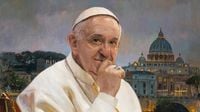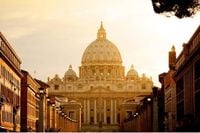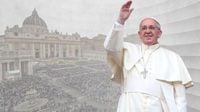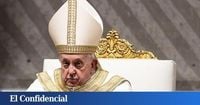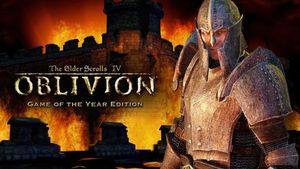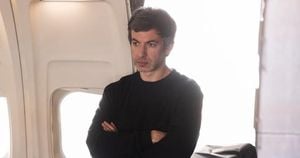Pope Francis, born Jorge Mario Bergoglio, passed away on Monday, April 21, 2025, at 07:35 hours, at the age of 88. His death has sparked widespread speculation about the process for selecting his successor, as well as interest in his life and tenure as the first Latin American pope in history.
Born on December 17, 1936, in Buenos Aires, Argentina, Bergoglio was the son of Piedmontese immigrants. He began his religious journey at the age of 21 when he entered the Society of Jesus, where he studied Chemistry, Humanities, Philosophy, and Theology. He was ordained a priest on December 13, 1969, and later became the archbishop of Buenos Aires, a position he held before his election as pope.
His papacy began on March 13, 2013, when he was elected as the 266th pope of the Catholic Church after the resignation of Benedict XVI. This marked a significant moment in history as he became the first pope to come from the Americas and the first Jesuit to hold the papacy. His election was announced with the famous phrase "Habemus Papam" from the balcony of St. Peter's Basilica, following five rounds of voting in the conclave.
During his 12 years and 39 days as pope, Francis was known for his focus on social justice, humility, and a commitment to the poor. His papacy was characterized by a series of reforms aimed at addressing issues within the Church, including the prevention of abuse scandals and the promotion of interfaith dialogue.
As the news of his passing spreads, many are looking ahead to the conclave that will convene to elect his successor. The process will begin with a period known as the Sede Vacante, during which the "Camerlengo," a designated cardinal, will oversee the administration of the Church.
Only cardinals under the age of 80 are eligible to vote in the conclave, which will take place in the Sistine Chapel under strict secrecy. A candidate must receive a two-thirds majority to be elected as the new pope. The anticipation surrounding the next pope is palpable, as speculation grows about who will take on the mantle of leadership for the Catholic Church.
Several names have emerged as potential successors, reflecting the ongoing ideological divide within the Church between progressive and conservative factions. Among the frontrunners are:
- Pietro Parolin (Italy, 69 years old): The current Secretary of State of the Vatican, Parolin is seen as a stabilizing figure who balances tradition and reform.
- Matteo Zuppi (Italy, 68 years old): The Archbishop of Bologna and president of the Italian Episcopal Conference, Zuppi is known for his pastoral approach and commitment to social issues.
- Luis Antonio Tagle (Philippines, 67 years old): Formerly the Archbishop of Manila, Tagle is viewed as a charismatic leader who embodies the Church's global reach, particularly in Asia.
- Peter Turkson (Ghana, 76 years old): A prominent African cardinal, Turkson has focused on social justice and environmental issues during his tenure in the Vatican.
- Robert Sarah (Guinea, 78 years old): A traditionalist, Sarah has been a vocal critic of some of Francis' reforms and is seen as a representative of the conservative wing.
- Christophe Pierre (France, 79 years old): The current apostolic nuncio to the United States, Pierre has experience in diplomatic relations and is considered a pragmatic choice.
The conclave process, which has been in place for over 800 years, involves a series of secret votes conducted in the Sistine Chapel. If no consensus is reached, voting continues until a candidate secures the necessary two-thirds majority. The outcome will be signaled by the color of smoke emitted from the chapel's chimney—black smoke indicates no decision has been made, while white smoke announces the election of a new pope.
In the wake of Francis' death, many are reflecting on his significant impact on the Church and the world. His commitment to social justice, environmental issues, and interfaith dialogue has left a lasting legacy that will shape the future direction of the Catholic Church. As the faithful mourn his passing, they also await the announcement of a new leader who will guide them in the years to come.
Francis' papacy was marked by numerous travels and outreach efforts, including visits to countries facing humanitarian crises and dialogues with leaders from various faiths. His ability to connect with people from diverse backgrounds was a hallmark of his leadership style, and his emphasis on compassion and understanding resonated with many.
As the world reflects on the life of Pope Francis, the question of who will succeed him looms large. The upcoming conclave will not only determine the future leadership of the Catholic Church but also signal the direction the Church will take in addressing contemporary issues and challenges.
In summary, Pope Francis' passing marks the end of an era for the Catholic Church. His legacy of compassion, reform, and commitment to social justice will undoubtedly influence the selection of his successor and shape the future of the Church for generations to come.
